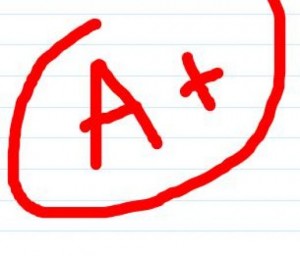College Grading: An ‘A’ for Effort?
 College students increasingly expect to be rewarded for trying hard, Max Roosevelt claims in NYT:
College students increasingly expect to be rewarded for trying hard, Max Roosevelt claims in NYT:
“Many students come in with the conviction that they’ve worked hard and deserve a higher mark,” Professor Grossman said. “Some assert that they have never gotten a grade as low as this before.”
He attributes those complaints to his students’ sense of entitlement. “I tell my classes that if they just do what they are supposed to do and meet the standard requirements, that they will earn a C,” he said. “That is the default grade. They see the default grade as an A.”
A recent study by researchers at the University of California, Irvine, found that a third of students surveyed said that they expected B’s just for attending lectures, and 40 percent said they deserved a B for completing the required reading. “I noticed an increased sense of entitlement in my students and wanted to discover what was causing it,” said Ellen Greenberger, the lead author of the study, called “Self-Entitled College Students: Contributions of Personality, Parenting, and Motivational Factors,” which appeared last year in The Journal of Youth and Adolescence. Professor Greenberger said that the sense of entitlement could be related to increased parental pressure, competition among peers and family members and a heightened sense of achievement anxiety.
Aaron M. Brower, the vice provost for teaching and learning at the University of Wisconsin-Madison, offered another theory. “I think that it stems from their K-12 experiences,” Professor Brower said. “They have become ultra-efficient in test preparation. And this hyper-efficiency has led them to look for a magic formula to get high scores.”
Given that I heard the same pleas fifteen years ago when I first started teaching, I’m dubious of the idea that this is something new. We all had students who felt entitled to good grades on the basis of how hard they thought they tried, because they got good grades in other classes or — and this was always my favorite — because “It’s my major!”
King Banaian, a hard-hearted economist, tells students “I don’t grade inputs.”
I have tried to overcome this by telling students they start with zero and must reach certain marks to attain grades. (I don’t use curves for grading.) Never use -2 or -5 when grading. Give +7 or +2 instead. Add, don’t subtract. A dean at Vanderbilt in the article uses the right noun-verb combination: “students make grades,” not “teachers give grades.”
[…]
These students have not been taught correctly. Freshman classes are meant to impart values for learning, and one of them is “you are graded in life on what you accomplish, not how much sweat you produced.”
He was referring to, among others, this quote:
“I think putting in a lot of effort should merit a high grade,” Mr. [Jason] Greenwood said. “What else is there really than the effort that you put in?” “If you put in all the effort you have and get a C, what is the point?” he added. “If someone goes to every class and reads every chapter in the book and does everything the teacher asks of them and more, then they should be getting an A like their effort deserves. If your maximum effort can only be average in a teacher’s mind, then something is wrong.”
This also caught the attention of my sometimes co-blogger Chris Lawrence, a political scientist at Texas A&M International, who displays a shared bias among many in the academy:
It will come to no surprise to any observer of contemporary collegiate culture that Mr. Greenwood is a kinesiology major, often a refuge for future gym teachers and meathead football coaches who think the education school’s curriculum is far too challenging. “Doing everything the teacher asks of [you]” isn’t A-worthy; doing everything the teacher asks of you better than most other people do it and achieving mastery thereof is A-worthy. And I say that as someone who has historically been a relatively lenient grader.
[…]
Snark aside, I think “consumer demand” by students is a less compelling aspect of the problem—or at least the dimension of the problem I see at TAMIU, which is rather different than the dimension I observed teaching at selective private institutions—than the complicity of faculty and—particularly—administrators in encouraging faculty to reward students for occupying space and going through the motions in a misguided effort to retain students (and, perhaps more importantly, their associated free money from state and federal coffers—the marginal cost of student instruction is essentially zero from an administrative perspective) in college who have neither the interest nor actual need to complete a four-year degree.
I had a similar experience at Troy State, where deans and higher administrators took the position that the students shouldn’t be held to high standards because, after all, they were from rural Alabama and the mere fact they were in college trying to better themselves was a big achievement.
UPenn English prof Erin O’Connor blames “the self-esteem movement” and offers an anecdote:
When I was in grade school (public, Indianapolis, 1970s), report cards were such a big deal. You’d get them every six weeks or so–these intimidating folded documents on stiff colored paper. The teacher would have hand-written your grades for everything from spelling to reading to math to science on them. There would also be handwritten comments directed to your parents on the back, and a place where your parents had to sign to say they’d seen the report card. We had to take the cards home to our parents in manila envelopes, and then bring them back to school the next day with the signatures on them. It was a big deal, all that kid-style accountability.
I can’t remember exactly when it happened–but I would guess it was along about third grade. The format of the report cards changed, and suddenly we didn’t just get a single grade for each subject. We got two: one for achievement, and one for effort. You might get an A for handwriting–but you’d perhaps get a B for effort. Or you might get a B in math, but an A for effort. It could go both ways–and it was a genuine way for the teacher to register both effort that was not translating into a good grade, and a good grade that was gotten without trying.
But I think that subtlety has been flattened out over the years; somewhere along the line, introducing grades for effort has translated into the assumption that effort matters more than achievement, or even that effort is the achievement. Along the way, “effort” has also been diminished; no longer necessarily synonymous with really giving your all, it’s become something students can gesture at, or approximate, by just going through the motions of showing up, more or less doing the reading, more or less completing the work.
Florida International lawprof Howard Wasserman offers the depressing observation,
The story deals with undergrads, but surely the same attitudes have or soon will trickle into law schools. Apparently, the legal writing listserv has been talking about this all day today, with one commentator capturing the issue as it relates to law school: “I think putting in a lot of effort should merit not getting sued for malpractice. What else is there really than the effort that you put in?”
I have not yet had a student dispute a final grade on these grounds. But I have had a student demand to know why he received no credit for class participation (which is worth 10 % of the final grade) when he was in class and prepared every day–but never spoke once the entire semester. He did not quite seem to understand that a) you don’t get credit for showing up, since that is the independently required as part of the class; b) it’s not entirely clear that you “participated” in class if you never actually, you know, participate; and c) even if doing the reading were enough, how am I supposed to know that you’ve done the reading if you never speak.
Timothy Burke, a Swarthmore College history prof, is reflective.
My personal sensibility shifts a bit from year to year. I’m not terribly consistent in my internal understanding of what I’m doing when I grade. In general, I tend to imagine the B as the default grade, and an A as a grade that says, “You did something considerably better than ordinary”. The C means, “This is really not as good as ordinary work”. Failures are either, “This is dramatically worse than the norm” or “You blew this off, and I can see that you did”.
I freely confess that I tend to have a slightly different understanding of how this scaling works out based on my understanding of what a student is capable of. The more I’ve graded a student, the more I form an expectation about what they can do. A student who has done consistently excellent, original work for me is likely to draw a much more negative reaction from me for doing ordinary work than a student who has done fine, decent but undistinguished work consistently. If I graded blind, I suspect I’d still have some pretty good guesses over time about the identity of writers, but maybe that would help shake up some of my assumptions. I’m weighing trying to do that next year for the first time.
Among non-academics, TNR’s Michelle Cottle seems most worked up by the report.
While I understand the self-defeating doubt that we’re trying to short-circuit here, there are, practically speaking, lots of ways to fail–much less fail to get an A. One of those is by not having much of an aptitude for a particular area of study. Not all of us are equipped to be rocket scientists, economists, or playwrights, just as not all of us are equipped to be actors or professional basketball players. If anything, a student who tries really, really, really hard at something and still repeatedly falls short might benefit from realizing that his talents lie elsewhere. (As could the rest of us: Not to state the obvious, but I don’t want a brain surgeon who graduated at the top of his class because he had perfect attendance. I want one who is an artist with a scalpel.) Go ahead: Aim for the stars. Don’t let anyone tell you you can’t do something. But if you actually try that thing and it turns out that you’re not so hot at it, don’t whine about unfair grading. Acknowledge that you have major room for improvement and decide where to go from there. The sooner kids learn how to deal with failure and move on, the less likely we are to have a bunch of whiny, fragile, self-entitled, poorly qualified adults wandering around wondering why their oh-so-stellar efforts aren’t properly appreciated in the real world.
Bruce McQain also gets on the “self-esteem” bandwagon.
When little Johnny gets a trophy and a party for being on a 12th place Pee-Wee Baseball team – the very same reward the first place team gets – why in the world wouldn’t he correlate “effort” with “result”? In his case his effort landed him the same rewards as the first place team. So 12th is just as much an “A” as 1st to him, isn’t it? And he gave his all to end up in 12th, so that just has to be good enough, right? Multiply that over a 18 year life time and it isn’t difficult to understand where this sense of entitlement comes from, is it?
Surprisingly, Megan McArdle, the world’s tallest female econoblogger, is sympathetic to the students:
I’m of two minds on this. The purpose of a grade is to show mastery (or not) of some volume of material. Is it fair to set the bar higher for me than for someone who isn’t as capable? Or vice versa? Is it fair to send the signal to employers that I wasn’t up to scratch even when I did objectively better work than some other student?
Maybe. After all, one of the things that employers and graduate schools are presumably looking for is ability to exert oneself consistently. Still, doesn’t this penalize students who develop a relationship with a professor?
Jacob Levy, a McGill political scientist, thinks much of this is “overwrought.”
[I]n any field of endeavor, “But I tried very hard!” is the first response to being told that you didn’t do a good job. It’s not strictly speaking relevant, but it’s part of how a person defends him- or herself, and tried to redeem his or her standing in the eyes of the other person. If you really make it the grounds of an appeal of a grade, of course, that’s a silly mistake. But the mere fact that you can find some undergrad sentences that express a sense of desert and entitlement doesn’t mean that there’s some new crisis wave of such things.
[…]
[A]t the end of the day: I like undergrads, and in my experience they try to do well. To the extent that they don’t understand what it means to do well, I think they respond well to having it explained to them. Making fun of them, by name, in the pages of the New York Times doesn’t seem to me like the way to go. Neither does the Allan Bloom/ Harvey Mansfield approach of elevating “Kids these days!” into social criticism.
I think that’s largely right. Professors were almost invariably excellent students, for whom their subject matter came easily and who were enthusiastically interested in their field of study. They were not, therefore, typical undergrads.
Further, as Burke notes, there’s a wide disconnect in grading practices from professor-to-professor and department-to-department. While that’s life, it’s also incredibly confusing to a teenager trying to get decent marks and figure out how the game is played. I was a much tougher than average grader, holding to the idea that “C is average, B is above average, and A is excellent.” But, when most professors are grading on a curve with B as the default median and A merely an above average grade, it’s not entirely unreasonable for students to be frustrated with the inequity.






I think that it would be a fascinating if cruel experiment if grades were awarded along different lines than they are now. If we wanted to teach to the kindergarten model, grades could be awarded strictly on effort rather than on outcome (inputs rather than outputs). If we wanted to teach to the model used in most of the “real world”, all freshmen would get C’s, sophomores would get B-‘s, juniors B+’s, and senior A’s, regardless of performance.
Other models are possible. For example, grades could be awarded based on need.
What would be interesting would be to measure outputs after a decade or so of the experiment.
Like you said, James, the game varies from department to department and even intradepartmentally. And that’s the game.
Success therefore depends on several factors such as effort, intelligence and information gathering (not just of subject matter but of the teacher, each student, and each class), relationships with teachers and students, standing withing those relationships, and many, many other subtle factors.
The key to succeeding this game is in deciding, within each class and with each teacher, how to properly weight the variables for the desirable results.
To misjudge and heavily weight effort within an “output-only” paradigm is foolhardy.
This is exactly how “real-life” is played. There are just more and different measures for success.
Did any of the posts mention the scourge of student evaluations of teachers?
In many universities, a profs student evaluation scores figure into tenure and promotion decisions.
Thus, there is an incentive to be an easy grader. There are no costs to the prof to give the students all “As” and the potential benefits for the prof are happier students and better evals.
The whole idea that students are even in a position to evaluate profs is absurd.
Student evaluations of professors is a topic I’ve written about extensively over the years but, no, I didn’t come across it in this discussion.
I agree with you and Banian. The typical grade descriptors are A=excellent, B=above average, C=average, D=below average. Showing up, reading the material, and studying are not excellent; they are expected. For most students doing this level of work should be enough to get a C in gen eds. An average student putting extra effort or an above average student doing what is required should mean a B. As should be relatively infrequent since excellence is relatively infrequent.
Grade inflation has extended into grad school here in the US. Everyone I have spoken to that attended grad school here reported that grades were almost exclusively As and Bs. If someone gets a C it is a message that they should consider leaving the program. From conversations with these people I can say definitively that they were not all above average or excellent.
Attending grad school in Europe I saw an entirely different grade distribution. I was initially shocked and disappointed at what I felt was barely getting by (an 8 in my first class). In every class some got 6s and I never saw a 10. I recently had my grades evaluated in order to find work in the US. 8 or better translated to an A. I’m not sure what it would take to get a C.
I give you a B for this post and myself a C for this comment;)
Well one thing I notice with regards to middle and high school is that kids are given a lot of credit for trying and not necessarily demonstrating a workable knowledge of the coursework.
I know my daughter’s math class is set up so that if you come to class and do your homework (no requirement to get the right answers just that you do every assigned question) and keep a neat/orderly notebook by the teacher’s standards (my dd doodles and it bothers her that he marks her down for her doodles in the margins), you can fail every exam with a grade somewhere in the 50’s to 60’s and still get a C in the course.
And while I think rewarding kids for hardwork is fine, I think giving somebody a C, when they can’t do the math just means more problems with they head to the next level in math.
I see this tendency to reward the successful production of neatly filled out busy work but not demonstrate real knowledge creeping into all sorts of classes.
In the grad school case, that really isn’t grade inflation, as a “C” is basically considered a failing grade, while it is considered average (or should be, anyway) for an undergrad. That was true during my time at the University of Texas and comports with the experiences other colleagues have conveyed to me.
Indeed, in the Master’s program in which I teach, students have to earn a B or better in the core Methods course, or they have to take it again. And, in general, you have to have a 3.0 (B) GPA to graduate. This creates its own set of issues to be sure, but it really isn’t grad inflation.
In other words, the metric in grad school tends to be different than the one for an undergrad.